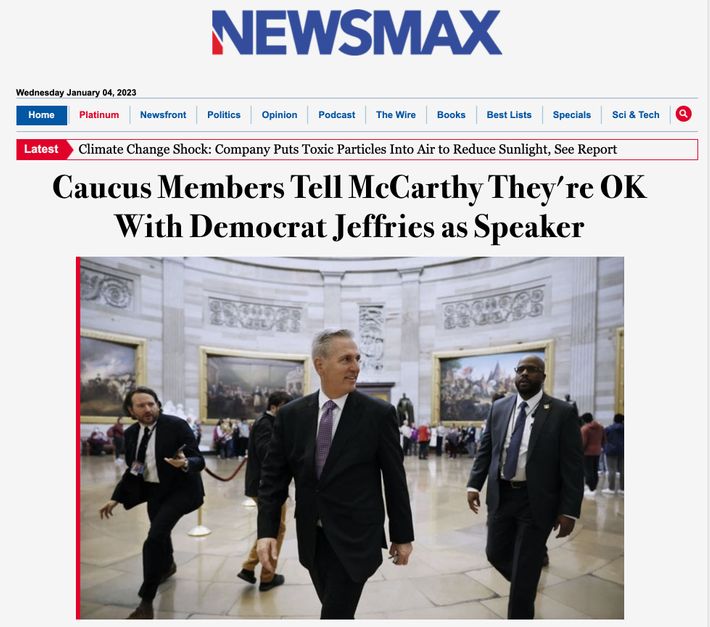
On one level, the chaos that’s presently consuming the GOP is so familiar as to be almost reassuring. Like birdsong announcing the return of spring, the braying of far-right backbenchers heralds a new Republican House majority. The Earth’s cycles remain unbroken, the universe’s laws unchanged.
In reality, however, the Republican civil war represents something new. The party’s inability to elect Kevin McCarthy as its Speaker indicates that it is more ungovernable than ever before.
For decades, whenever Republicans have secured midterm victories during Democratic presidencies, the party’s newfound House majority has proceeded to squabble over precisely how thoroughly the GOP should ignore the limits on its popular support and constitutional authority. Under Bill Clinton, Newt Gingrich sought to coerce the Democratic Party into slashing Medicare and capital-gains taxes by shutting down the government, much to the consternation of some moderate Republicans. Under Barack Obama, the tea party tried to force the Affordable Care Act’s repeal by threatening to drive the U.S. government into default.
Today, 20 conservative hard-liners are threatening to kill McCarthy’s bid for House Speaker, ostensibly because they believe he has historically been willing to reach legislative compromises with Democrats in order to keep the government running — or, in hard-liners’ parlance, to “fund the woke and weaponized government leviathan.”
The perennial extremism and obstinacy of the House GOP’s far-right gadflies — and the Republican leadership’s inability to discipline them — partly reflect structural changes in U.S. politics that have undermined the authority of both parties’ Establishments.
In the wake of the Democratic Party’s fractious 1968 convention, popular pressure led both parties to outsource their nomination processes almost entirely to primary voters, a development that gave the news media and ideological activists more influence over each party’s internal governance — and party bosses far less. Meanwhile, campaign-finance laws enacted following the Watergate scandal tightly restricted the amount of money that donors could give to the major parties. Rather than getting big money out of politics, however, these reforms merely transferred such money away from the parties themselves and toward (even more democratically unaccountable) corporate and ideological PACs. As a result, backbenchers became less vulnerable to the whims of party leaders and more amenable to the appeals of business interests and wealthy ideologues.
Meanwhile, over the past three decades, the rise of right-talk-radio juggernauts such as Rush Limbaugh and major conservative outlets like Fox News created further alternative power centers to the Republican leadership. These right-wing-media institutions had distinct incentives from the GOP. Whereas Republicans must appeal to a mass electorate, Fox News and Limbaugh served niche audiences that were both far more conservative and politically engaged than the median voter. And while internecine warfare is bad for party governance, it’s quite good for ratings: The media exists to tell stories, and you can’t have a compelling narrative without conflict.
Put together a messy, ideological media that lives for drama, a sovereign primary electorate, and myriad PACs offering independent campaign financing and you end up with unruly backbenchers and weak party Establishments.
This is all old news, of course. Since 2016, at the latest, it’s been clear that Red America is a failed state with no stable leadership, only warring tribes fighting to fill a power vacuum. Nevertheless, the present battle over McCarthy’s Speakership bid suggests that power within the contemporary GOP is even more radically decentralized than previously thought.
For the first time in 100 years, the House failed to elect a Speaker on its first ballot this week. As of this writing, five subsequent votes have yet to produce a new leader for Congress’s lower chamber. What’s remarkable about this stalemate isn’t that the GOP leadership has failed to corral the votes of 20 rank-and-file conservatives; it’s that the combined force of Fox News, Donald Trump, and right-wing talk radio has failed to do so too.
On Wednesday morning, Trump told his followers on Truth Social, “Kevin McCarthy will do a good job, and maybe even a GREAT JOB — JUST WATCH!,” adding, “It’s now time for all of our GREAT Republican House Members to VOTE FOR KEVIN, CLOSE THE DEAL, TAKE THE VICTORY, & WATCH CRAZY NANCY PELOSI FLY BACK HOME TO A VERY BROKEN CALIFORNIA.”
Behind the scenes, Trump has been working the phones for McCarthy, encouraging his ostensible loyalists in the rebel faction to toe the party line. The former president has been joined in that endeavor by some other leading lights of the MAGA movement such as House representatives Jim Jordan and Marjorie Taylor Greene.
Fox News’ prime-time hosts largely followed Trump’s lead on Tuesday night. Sean Hannity implored the House GOP to rally behind McCarthy so that its investigations of the Biden administration and FBI can begin. Laura Ingraham, meanwhile, noted that the House rebels’ intransigence threatened to hand the Speakership to a Democrat. Even Tucker Carlson, heretofore an anti-McCarthyite, encouraged the would-be Speaker and conservative hard-liners to cut a deal.
Fox News’ rival conservative channel, Newsmax, has been no less supportive of McCarthy’s bid. On Wednesday, the network’s website portrayed the conservative rebels as traitors willing to throw House control to the Democrats while spotlighting Trump’s endorsement of McCarthy. Even Breitbart’s coverage of the fight has been relatively neutral. On the radio, right-wing host Mark Levin has denounced the hard-liners as “saboteurs.”
Nevertheless, Matt Gaetz & Co. persisted.
It is one thing for Republican backbenchers to humiliate their party in defiance of its leadership; it is another for them to do so in defiance of the GOP Establishment, Donald Trump, and the bulk of the conservative media. In the past, the Republicans’ internecine feuds pitted the party’s disparate power centers against one another. In the current feud, however, all of the right’s major institutions are aligned behind McCarthy. And roughly 20 House Republicans feel comfortable defying their party anyway.
This intransigence is all the more extraordinary when one considers how little is actually at stake. There are no profound ideological divisions between Gaetz and (McCarthy supporter) Taylor Greene. Electing Steve Scalise or Andy Biggs or any other House Republican Speaker will not change the fact that Democrats control the Senate and the presidency and, therefore, that the conservative agenda cannot be implemented at the present time. The rebels do have official demands. But these are so outlandish as to call into question their sincerity; the House is not going to create a new legal entity that empowers the Freedom Caucus to unilaterally wage lawsuits.
In truth, it might be this very pointlessness that has rendered the GOP’s civil war so difficult to resolve. The House’s conservative hard-liners may be less interested in any particular outcome than they are in the chaos itself; their means may be their end. Placing oneself at the center of a days-long national news firestorm attracts attention to one’s social-media feeds, and that attention can eventually be monetized in all manner of ways. As Puck’s Tara Palmeri notes, far-right congressman Biggs has been raking in campaign contributions on the strength of his “Speakership revolt antics.”
Indeed, the simultaneous ascent of social media and small-dollar online fundraising is likely responsible for the present mutiny. In the first decade of this century, a conservative representative who earned the ire of party leadership and Fox News and major right-wing PACs would have had a difficult time reaching a mass audience or raising campaign cash. Today, Twitter provides Gaetz with a captive audience of 2 million people, a significant minority of whom will click on whatever digital fundraising appeals he sends their way.
Beyond providing congressional provocateurs with an independent fundraising base, social media also provides them with a plethora of options for cashing in on their own intransigence-induced celebrity, should they decide to return to the private sector. Torpedoing McCarthy’s career might not advance the conservative movement’s substantive goals. But it could help a relatively obscure Republican House member secure national attention and, thus, social-media followers to whom he or she can later sell books or supplements.
Centrifugal forces have been undermining major party Establishments for half a century now. But digital media’s ongoing fragmentation of popular attention has turbocharged those forces and, at least on the right, produced both a radically decentralized power structure and a ton of perverse incentives for low-level Republican lawmakers.
All of this is good for the quality of C-SPAN’s content. For the quality of governance in the world’s most powerful nation, however, it seems a bit less auspicious.
More on the speaker stalemate
- Kevin McCarthy’s Tarnished Triumph
- Kevin McCarthy’s Humiliation Finally Ends: Live Updates
- C-Span’s Editorial Director on the Network’s Biggest Week Ever































